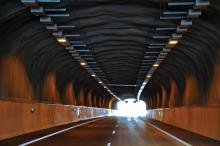The Finnish Transport Agency has signed an agreement with a consortium formed by Skanska Infra, Pöyry and Ramboll for work on Highway 6 between Taavetti and Lappeenranta. This consortium also carried out the project development phase, which was launched in March 2015. The work is being carried out as an alliance-based project ensuring that the client and consortium are responsible for project design and construction, share the risks and opportunities and form a joint organisation.
The work calls for Hig
The Finnish Transport Agency has signed an agreement with a consortium formed by 2296 Skanska Infra, 5775 Pöyry and 6801 Ramboll for work on Highway 6 between Taavetti and Lappeenranta. This consortium also carried out the project development phase, which was launched in March 2015. The work is being carried out as an alliance-based project ensuring that the client and consortium are responsible for project design and construction, share the risks and opportunities and form a joint organisation.
The work calls for Highway 6 to be upgraded, mainly in its existing location, to a four-lane highway with a central barrier. The work is being carried out along a 28km stretch, including 12km of new road. The improvement will improve traffic flow and safety for users. Environmental mitigation will include using acoustic screening and ground water protection.
Highway 6 is the main traffic connection in South Karelia. It serves local and long-distance traffic and is a key route for industry and the nearby port. The project will be completed segment by segment in 2017 and 2018.
The project is the Finnish Transport Agency's first ordinary road construction project implemented using this alliance approach. Project manager Harri Liikanen said, "Based on the development phase, the approach is also highly suitable for a project like this."
"Together, we have successfully progressed on the project design as planned. In the development phase, we found solutions for gradually introducing the highway sooner than originally scheduled. This also significantly decreases any inconveniences caused to road users,” said Janne Tikkamäki, construction manager at Skanska.
"Finland has about 78,000 km of public roads that are vital for our daily traffic and the competitiveness of the business sector. Digitalisation is a strong element of the road design, too. This project, for example, develops data modelling with road maintenance in mind. This means that the benefits do not only cover the design or construction phase, or even are restricted to this project alone,” said Peter Molin, director, Infrastructure and Transport, at Ramboll.
The work calls for Highway 6 to be upgraded, mainly in its existing location, to a four-lane highway with a central barrier. The work is being carried out along a 28km stretch, including 12km of new road. The improvement will improve traffic flow and safety for users. Environmental mitigation will include using acoustic screening and ground water protection.
Highway 6 is the main traffic connection in South Karelia. It serves local and long-distance traffic and is a key route for industry and the nearby port. The project will be completed segment by segment in 2017 and 2018.
The project is the Finnish Transport Agency's first ordinary road construction project implemented using this alliance approach. Project manager Harri Liikanen said, "Based on the development phase, the approach is also highly suitable for a project like this."
"Together, we have successfully progressed on the project design as planned. In the development phase, we found solutions for gradually introducing the highway sooner than originally scheduled. This also significantly decreases any inconveniences caused to road users,” said Janne Tikkamäki, construction manager at Skanska.
"Finland has about 78,000 km of public roads that are vital for our daily traffic and the competitiveness of the business sector. Digitalisation is a strong element of the road design, too. This project, for example, develops data modelling with road maintenance in mind. This means that the benefits do not only cover the design or construction phase, or even are restricted to this project alone,” said Peter Molin, director, Infrastructure and Transport, at Ramboll.






